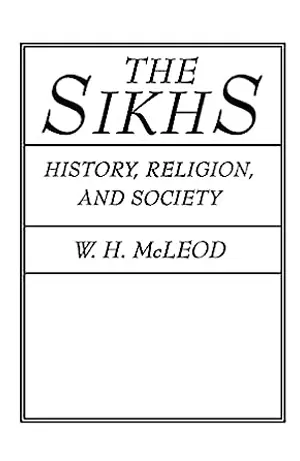Sikhs have a rich and complex history, spanning centuries of political, social, and religious developments. From their origins in the 15th century to the establishment of the Sikh Empire in the 19th century, the Sikh community has undergone significant changes and challenges. In this article, we will be exploring some of the best books written on Sikh history, including works on the early history of Sikhs, their religious beliefs and practices, and the Sikh diaspora in the West. These books provide a detailed account of the political, social, and religious developments that shaped the Sikh community throughout history and offer a comprehensive understanding of the Sikh community, their beliefs and practices, and their evolution in the West.
1. A History of the Sikhs: Volume 1: 1469-1839
 "A History of the Sikhs: Volume 1: 1469-1839" by Khushwant Singh offers a comprehensive exploration of the Sikh community's journey from its inception in the late 15th century to the early 19th century. Khushwant Singh, a highly respected author and historian, provides a detailed account that delves deep into the historical, social, and political dimensions of Sikhism during this critical period. In this book, Singh meticulously examines the life and teachings of Guru Nanak, the founding Guru of Sikhism, and traces the progression and evolution of the Sikh faith under subsequent Gurus. He delves into significant events such as the formation of the Khalsa, the militarization of the Sikhs, and their resistance against external powers, notably the Mughal Empire. The narrative also highlights the rise of the Sikh Empire under the visionary leadership of Maharaja Ranjit Singh.
"A History of the Sikhs: Volume 1: 1469-1839" by Khushwant Singh offers a comprehensive exploration of the Sikh community's journey from its inception in the late 15th century to the early 19th century. Khushwant Singh, a highly respected author and historian, provides a detailed account that delves deep into the historical, social, and political dimensions of Sikhism during this critical period. In this book, Singh meticulously examines the life and teachings of Guru Nanak, the founding Guru of Sikhism, and traces the progression and evolution of the Sikh faith under subsequent Gurus. He delves into significant events such as the formation of the Khalsa, the militarization of the Sikhs, and their resistance against external powers, notably the Mughal Empire. The narrative also highlights the rise of the Sikh Empire under the visionary leadership of Maharaja Ranjit Singh.
2. The Sikhs - History, Religion, and Society
 "The Sikhs - History, Religion, and Society" by W. H. McLeod provides a comprehensive examination of the Sikh community, exploring its history, religion, and societal aspects. W. H. McLeod, a renowned scholar in Sikh studies, presents a detailed and insightful analysis of the Sikh faith and its significance in the broader context of Indian history. In this book, McLeod delves into the origins of Sikhism, tracing its development from the time of Guru Nanak, the founder of the faith, to the present day. He explores the teachings and philosophy of the Sikh Gurus, Guru Granth Sahib, the evolution of Sikh religious practices and rituals, and the formation of Sikh institutions. Additionally, McLeod examines the social, cultural, and political dimensions of Sikhism, shedding light on the Sikh community's interactions with other religious groups and its contributions to society.
"The Sikhs - History, Religion, and Society" by W. H. McLeod provides a comprehensive examination of the Sikh community, exploring its history, religion, and societal aspects. W. H. McLeod, a renowned scholar in Sikh studies, presents a detailed and insightful analysis of the Sikh faith and its significance in the broader context of Indian history. In this book, McLeod delves into the origins of Sikhism, tracing its development from the time of Guru Nanak, the founder of the faith, to the present day. He explores the teachings and philosophy of the Sikh Gurus, Guru Granth Sahib, the evolution of Sikh religious practices and rituals, and the formation of Sikh institutions. Additionally, McLeod examines the social, cultural, and political dimensions of Sikhism, shedding light on the Sikh community's interactions with other religious groups and its contributions to society.
3. Sikhism: A Very Short Introduction
 "Sikhism: A Very Short Introduction" by Eleanor Nesbitt: This book offers a concise introduction to the history, beliefs, and practices of Sikhism. It covers the major events and figures in Sikh history, as well as the key concepts and practices of the faith.
"Sikhism: A Very Short Introduction" by Eleanor Nesbitt: This book offers a concise introduction to the history, beliefs, and practices of Sikhism. It covers the major events and figures in Sikh history, as well as the key concepts and practices of the faith.
4. The Sikh Religion: Its Gurus, Sacred Writings, and Authors
 "The Sikh Religion: Its Gurus, Sacred Writings, and Authors" is a seminal work by Max Arthur Macauliffe, a notable British civil servant and scholar. The book serves as an in-depth exploration of the Sikh religion, focusing on its Gurus, sacred scriptures, and prominent authors. Macauliffe's comprehensive research sheds light on the origins and development of Sikhism, providing valuable insights into the lives and teachings of the Sikh Gurus, from Guru Nanak Dev Ji to Guru Gobind Singh Ji. The book delves into their spiritual wisdom, social reform, and contributions to the Sikh community.
"The Sikh Religion: Its Gurus, Sacred Writings, and Authors" is a seminal work by Max Arthur Macauliffe, a notable British civil servant and scholar. The book serves as an in-depth exploration of the Sikh religion, focusing on its Gurus, sacred scriptures, and prominent authors. Macauliffe's comprehensive research sheds light on the origins and development of Sikhism, providing valuable insights into the lives and teachings of the Sikh Gurus, from Guru Nanak Dev Ji to Guru Gobind Singh Ji. The book delves into their spiritual wisdom, social reform, and contributions to the Sikh community.
5. History of the Sikhs: From the Origin of the Nation to the Battles of the Sutlej
 "History of the Sikhs: From the Origin of the Nation to the Battles of the Sutlej" is a historical book written by Joseph Davey Cunningham. The book provides a comprehensive account of the history of the Sikh people, starting from the origins of the Sikh nation and extending up to the battles fought on the Sutlej River. Joseph Davey Cunningham, an English soldier, and scholar, delves into the rich history of the Sikhs, tracing their origins, religious teachings, and the development of the Sikh community. The book explores the rise of Sikhism under the leadership of Guru Nanak and the subsequent Sikh Gurus, as well as the formation of the Khalsa under Guru Gobind Singh.
"History of the Sikhs: From the Origin of the Nation to the Battles of the Sutlej" is a historical book written by Joseph Davey Cunningham. The book provides a comprehensive account of the history of the Sikh people, starting from the origins of the Sikh nation and extending up to the battles fought on the Sutlej River. Joseph Davey Cunningham, an English soldier, and scholar, delves into the rich history of the Sikhs, tracing their origins, religious teachings, and the development of the Sikh community. The book explores the rise of Sikhism under the leadership of Guru Nanak and the subsequent Sikh Gurus, as well as the formation of the Khalsa under Guru Gobind Singh.
6. History of the Sikhs: Sikh Commonwealth or Rise & Fall of Sikh Misls
 "History of the Sikhs: Sikh Commonwealth or Rise & Fall of Sikh Misls" by Hari Ram Gupta, is a comprehensive historical account that focuses on the Sikh Commonwealth and the rise and fall of the Sikh Misls. It is the fourth volume in the series "History of the Sikhs" written by Hari Ram Gupta. The book delves into the historical context and provides an in-depth examination of the Sikh Misls, which were autonomous military organizations formed by the Sikhs in the 18th century. These Misls played a crucial role in the establishment of the Sikh Empire under Maharaja Ranjit Singh.
"History of the Sikhs: Sikh Commonwealth or Rise & Fall of Sikh Misls" by Hari Ram Gupta, is a comprehensive historical account that focuses on the Sikh Commonwealth and the rise and fall of the Sikh Misls. It is the fourth volume in the series "History of the Sikhs" written by Hari Ram Gupta. The book delves into the historical context and provides an in-depth examination of the Sikh Misls, which were autonomous military organizations formed by the Sikhs in the 18th century. These Misls played a crucial role in the establishment of the Sikh Empire under Maharaja Ranjit Singh.
7. The Sikhs of the Punjab
 "The Sikhs of the Punjab" is a renowned book authored by J.S. Grewal, a distinguished historian and scholar specializing in Sikh history and culture. This book offers a comprehensive exploration of the Sikh community in the Punjab region of India, tracing their historical journey, religious beliefs, social customs, and cultural practices. Grewal's work explores in-depth the origins, development, and various aspects of Sikhism, providing valuable insights into the Sikh community in the Punjab region.
"The Sikhs of the Punjab" is a renowned book authored by J.S. Grewal, a distinguished historian and scholar specializing in Sikh history and culture. This book offers a comprehensive exploration of the Sikh community in the Punjab region of India, tracing their historical journey, religious beliefs, social customs, and cultural practices. Grewal's work explores in-depth the origins, development, and various aspects of Sikhism, providing valuable insights into the Sikh community in the Punjab region.
8. Sikhism: A Very Short Introduction
 "Sikhism: A Very Short Introduction" by Eleanor Nesbitt provides a comprehensive overview of Sikhism, offering valuable insights into the religion's beliefs, practices, and history. With a global following of over 20 million people, Sikhism is a significant world religion, yet there remains a need to raise awareness and understanding about it, as evidenced by post-September 11 incidents where Sikhs were mistakenly targeted due to their appearance.
"Sikhism: A Very Short Introduction" by Eleanor Nesbitt provides a comprehensive overview of Sikhism, offering valuable insights into the religion's beliefs, practices, and history. With a global following of over 20 million people, Sikhism is a significant world religion, yet there remains a need to raise awareness and understanding about it, as evidenced by post-September 11 incidents where Sikhs were mistakenly targeted due to their appearance.
9. The Sikh Diaspora: The Search For Statehood
 "The Sikh Diaspora: The Search For Statehood" by Darsham Singh Tatla offers a comprehensive exploration of the relationship between Sikh communities living outside their homeland and their interactions with both their host countries and their indigenous Sikh counterparts. Focusing on the history and politics of the Sikh diaspora, the book delves into the implications of migration on issues of nationality, citizenship, and sovereignty. By examining the experiences of Sikh migrants and their descendants, Tatla sheds light on the challenges and opportunities they face in navigating their identity and belonging in new cultural and political contexts. The book analyzes the dynamic interplay between the home and host states, as well as the interactions and connections among Sikh communities dispersed across the globe.
"The Sikh Diaspora: The Search For Statehood" by Darsham Singh Tatla offers a comprehensive exploration of the relationship between Sikh communities living outside their homeland and their interactions with both their host countries and their indigenous Sikh counterparts. Focusing on the history and politics of the Sikh diaspora, the book delves into the implications of migration on issues of nationality, citizenship, and sovereignty. By examining the experiences of Sikh migrants and their descendants, Tatla sheds light on the challenges and opportunities they face in navigating their identity and belonging in new cultural and political contexts. The book analyzes the dynamic interplay between the home and host states, as well as the interactions and connections among Sikh communities dispersed across the globe.
The books discussed above offer a comprehensive and deep dive into the history and culture of the Sikh community. They cover a wide range of topics, from the origins of Sikhism to the present day, and provide a thorough account of the political, social, and religious developments that have influenced the Sikh community throughout history. These books not only provide an understanding of the Sikh community and their beliefs and practices but also delve into the unique experiences and challenges faced by Sikhs in different countries and regions. They are a must-read for anyone looking to gain a deeper understanding of the complexities of Sikh history and culture.













